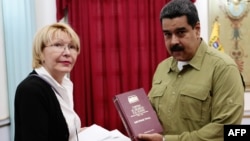It was a mesmerizing moment in Venezuela's fast-moving political crisis.
Towards the end of a dry and detailed speech on her office's annual report, the country's bespectacled Attorney General Luisa Ortega paused, cleared her throat - and delivered a bombshell.
"I consider it a historic and unavoidable duty," she began, before denouncing two Supreme Court sentences that annulled the opposition-led congress and took Venezuela deeper into authoritarian rule.
Hitherto known as a stalwart ally of the ruling Socialists, whose prosecutors have helped put behind bars dozens of President Nicolas Maduro's foes, Ortega's public dissent on Friday was stunning - and the impact was immediate.
Citing Ortega, the unpopular Maduro convened a special security committee at midnight which ordered the court to reconsider, and the offending clauses were scrubbed on Saturday.
It was a major climb-down by the Supreme Court, whose constant rulings against the opposition have bolstered Maduro's power, and the latest twist in a political and economic crisis that has plagued the South American OPEC nation in recent years.
Yet just as opposition supporters began lionizing Ortega and speculation surged of cracks in Maduro's inner circle, she visited him over the weekend for a friendly meet-and-greet in the presidential palace as cameras clicked.
That calmed rumors of a big rift among Venezuela's ruling elite and even fueled a conspiracy theory it had all been choreographed to allow Maduro appear like a statesman above an inter-institutonal fray.
However, Ortega's disagreement appeared genuine. It was not her first and it possibly indicated wider dissatisfaction within government over human rights and democracy issues.
In a lesser-noted incident, the 59-year-old lawyer from central Guarico state who has been the nation's top prosecutor since 2007, spoke out last year over the killing of 13 civilians by soldiers who first tried to cover it up.
"I am committed to human rights," she said then.
And in another incident earlier in 2016, when authorities initially rubbished opposition reports of a massacre of miners in the jungle, it was Ortega who then provided a stream of information confirming 17 bodies had been discovered.
"BRAVE WOMAN"
Ortega has also criticized sometimes over-violent state crackdowns on crime and gangs.
"She's a brave, honest and hardworking woman ... I've known her since the 1990s," said Ana Osorio, a left-wing politician who was a minister under Maduro's predecessor Hugo Chavez and is now part of a dissident group called Socialist Tide.
Such praise does not wash, however, with many supporters of the roughly 100 opposition activists languishing in Venezuela's jails, including the best-known prisoner Leopoldo Lopez.
Opposition leaders, and some dissident judges, say many of Ortega's prosecutors have bowed to political pressure in the last few years, peddling fabricated evidence and exaggerated accusations to aid repression by the Maduro government.
"She doesn't go from villain to hero," said Jose Haro, a lawyer defending many of the jailed activists, who are mostly charged with violence or plotting against the state.
"She goes from being someone who for a long time was indifferent and complicit in grave rights abuses to someone who made a 180 degree change, and decided to abstain from continuing to allow abuses."
Ortega has plenty of "revolutionary" credentials: she is married to a lawmaker from the ruling Socialist Party, and sat at the front row during Chavez's 2013 funeral.
However, she is believed to have been unhappy for months with the continued jailing of some activists despite judges' orders to free them, sources within her office say, and could be an influential brake within government going forward.
The sources spoke of a distancing between her and first lady Cilia Flores and Supreme Court head Maikel Moreno amid inter-faction rivalries within the ruling "Chavismo" movement.
Though cynics say Ortega may be trying to protect her name with an eye to the future if the government falls, her prosecutors have in fact since last year begun showing increasing concern for prisoners' health and complaints.
Given that emerging disquiet within the judiciary, lawyers say some cases have also been moved to military courts whose judges are directly named by the executive.
"We sign freedom orders, we do the processes, and then the Sebin [intelligence service] doesn't want to let prisoners go free," one frustrated prosecutor in Ortega's office told Reuters.





